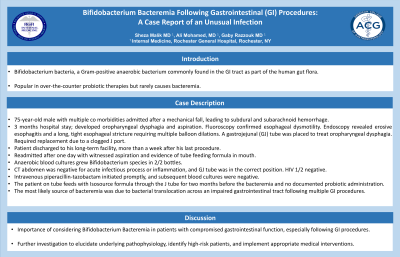Tuesday Poster Session
Category: Practice Management
P4100 - Bifidobacterium Bacteremia Following Gastrointestinal (GI) Procedures: A Case Report of an Unusual Infection
Tuesday, October 24, 2023
10:30 AM - 4:00 PM PT
Location: Exhibit Hall

Has Audio
- SM
Sheza Malik, MD
Rochester General Hospital
Rochester, NY
Presenting Author(s)
Sheza Malik, MD, Ali Mohamed, MD, Gaby Razzouk,
Rochester General Hospital, Rochester, NY
Introduction: Bifidobacterium bacteria, a Gram-positive anaerobic bacterium commonly found in the GI tract as part of the human gut flora, is popular in over-the-counter probiotic therapies but rarely causes bacteremia. We report a unique case of Bifidobacterium bacteremia in a 75-year-old male following GI procedures, which, to our knowledge, has not been previously documented in the literature.
Case Description/Methods: A 75-year-old male with history of traumatic brain injury, Gastroesophageal reflux disease, urethral stricture with a chronic indwelling foley catheter, and hypertension, was admitted after a mechanical fall, which revealed a subdural and subarachnoid hemorrhage. During his three months hospital stay, he developed oropharyngeal dysphagia and aspiration. Fluoroscopy confirmed esophageal dysmotility. Endoscopy revealed erosive esophagitis and a long, tight esophageal stricture requiring multiple balloon dilations. A gastrojejunal (GJ) tube was placed to treat his oropharyngeal dysphagia. Subsequently, it required replacement due to a clogged J port.
Following the GJ tube replacement, the patient was discharged to his long-term facility, more than a week after his last procedure. However, he was readmitted after one day with witnessed aspiration and evidence of tube feeding formula in mouth. The patient was overall stable, with normal white blood cell count and lactate levels. Anaerobic blood cultures grew Bifidobacterium species in 2/2 bottles. Intravenous piperacillin-tazobactam was initiated promptly, and subsequent blood cultures were negative. CT abdomen was negative for acute infectious process or inflammation, and GJ tube was in the correct position. HIV 1/2 ab/ag was negative. Given the patient's stable status, he was transitioned to ampicillin-sulbactam and later discharged on amoxicillin-clavulanic acid to complete a 14-day course of antibiotics. The patient had been on tube feeds with Isosource formula through the J tube for two months before the bacteremia and no documented probiotic administration was noted. The most likely source of bacteremia was due to bacterial translocation across an impaired gastrointestinal tract following multiple GI procedures.
Discussion: This case highlights importance of considering Bifidobacterium Bacteremia in patients with compromised gastrointestinal function, especially following GI procedures. Further investigation is needed to elucidate underlying pathophysiology, identify high-risk patients, and implement appropriate medical interventions.
Disclosures:
Sheza Malik, MD, Ali Mohamed, MD, Gaby Razzouk, . P4100 - Bifidobacterium Bacteremia Following Gastrointestinal (GI) Procedures: A Case Report of an Unusual Infection, ACG 2023 Annual Scientific Meeting Abstracts. Vancouver, BC, Canada: American College of Gastroenterology.
Rochester General Hospital, Rochester, NY
Introduction: Bifidobacterium bacteria, a Gram-positive anaerobic bacterium commonly found in the GI tract as part of the human gut flora, is popular in over-the-counter probiotic therapies but rarely causes bacteremia. We report a unique case of Bifidobacterium bacteremia in a 75-year-old male following GI procedures, which, to our knowledge, has not been previously documented in the literature.
Case Description/Methods: A 75-year-old male with history of traumatic brain injury, Gastroesophageal reflux disease, urethral stricture with a chronic indwelling foley catheter, and hypertension, was admitted after a mechanical fall, which revealed a subdural and subarachnoid hemorrhage. During his three months hospital stay, he developed oropharyngeal dysphagia and aspiration. Fluoroscopy confirmed esophageal dysmotility. Endoscopy revealed erosive esophagitis and a long, tight esophageal stricture requiring multiple balloon dilations. A gastrojejunal (GJ) tube was placed to treat his oropharyngeal dysphagia. Subsequently, it required replacement due to a clogged J port.
Following the GJ tube replacement, the patient was discharged to his long-term facility, more than a week after his last procedure. However, he was readmitted after one day with witnessed aspiration and evidence of tube feeding formula in mouth. The patient was overall stable, with normal white blood cell count and lactate levels. Anaerobic blood cultures grew Bifidobacterium species in 2/2 bottles. Intravenous piperacillin-tazobactam was initiated promptly, and subsequent blood cultures were negative. CT abdomen was negative for acute infectious process or inflammation, and GJ tube was in the correct position. HIV 1/2 ab/ag was negative. Given the patient's stable status, he was transitioned to ampicillin-sulbactam and later discharged on amoxicillin-clavulanic acid to complete a 14-day course of antibiotics. The patient had been on tube feeds with Isosource formula through the J tube for two months before the bacteremia and no documented probiotic administration was noted. The most likely source of bacteremia was due to bacterial translocation across an impaired gastrointestinal tract following multiple GI procedures.
Discussion: This case highlights importance of considering Bifidobacterium Bacteremia in patients with compromised gastrointestinal function, especially following GI procedures. Further investigation is needed to elucidate underlying pathophysiology, identify high-risk patients, and implement appropriate medical interventions.
Disclosures:
Sheza Malik indicated no relevant financial relationships.
Ali Mohamed indicated no relevant financial relationships.
Gaby Razzouk indicated no relevant financial relationships.
Sheza Malik, MD, Ali Mohamed, MD, Gaby Razzouk, . P4100 - Bifidobacterium Bacteremia Following Gastrointestinal (GI) Procedures: A Case Report of an Unusual Infection, ACG 2023 Annual Scientific Meeting Abstracts. Vancouver, BC, Canada: American College of Gastroenterology.
